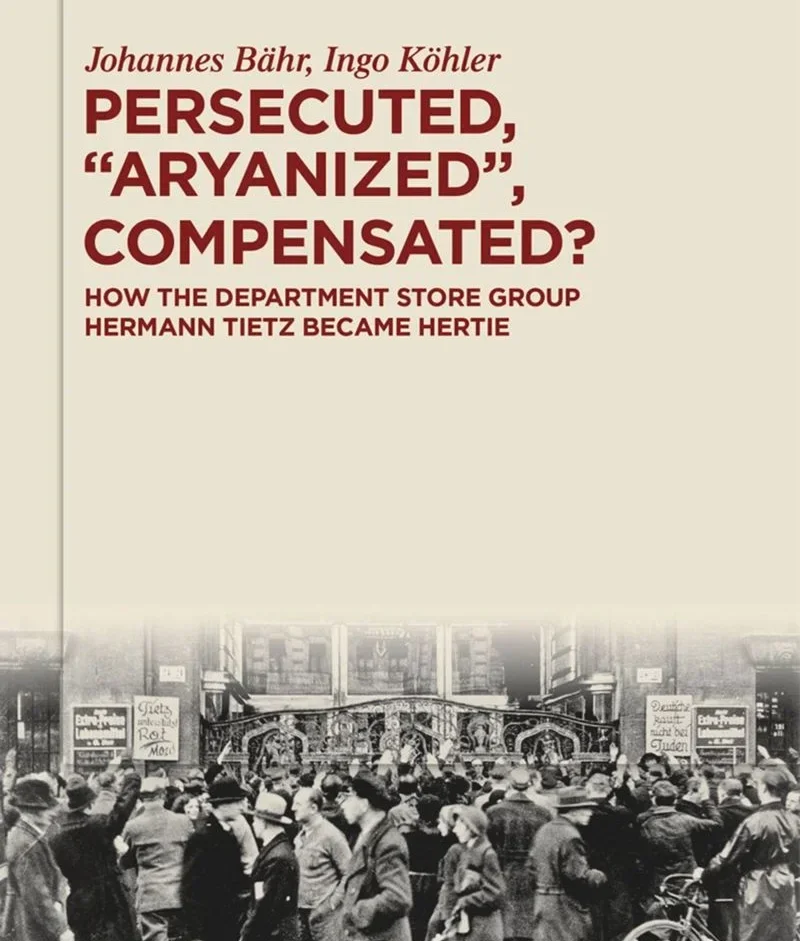
Study by the Gesellschaft für Unternehmensgeschichte
Persecuted, “Aryanized,” Compensated?
Key findings of the study
The Tietz/Zwillenberg family was quickly forced out of their department stores' group after the Nazis came to power. Their departure from Hermann Tietz OHG, which included over 30 group companies, is considered one of the largest "Aryanizations" of the early years of the Nazi regime. The study shows how the owner family came under pressure from the particularly radical anti-Semitic hostility in the department stores' sector in 1933 and was forced to hand over the group in a settlement agreement dated August 1934. The high losses suffered by the family are also explained. Contrary to what was later claimed, there can be no question of "fair treatment".
The Hermann Tietz company was taken over by Hertie Kaufhaus-Beteiligungs GmbH, which had been founded by banks specifically for this purpose, and continued under the name Hertie Waren- und Kaufhaus GmbH. Hertie managing director Georg Karg profited from the "Aryanization" as a secondary purchaser, as he was able to buy the company's shares from the banks from 1937. The study describes for the first time how he managed to do this, and how he also took over small department stores from Jewish ownership.
The Tietz and Zwillenberg families parted ways when they emigrated. The Tietz family emigrated to Switzerland in 1937 and later on to Cuba and the USA. Hugo Zwillenberg was imprisoned in a concentration camp in 1938, but was then able to flee to the Netherlands with his wife and children, where the family narrowly escaped deportation in 1943. Most of the assets that remained in Germany were confiscated from the Tietz and Zwillenberg families by the authorities of the Nazi state.
Frank-Jürgen Weise, former Chairman of the Board of the Hertie Foundation
Frank-Jürgen Weise, former Chairman of the Board of the Hertie Foundation
Among those present were: Frank-J. Weise, Prof. Ingo Köhler, Janet and Larry Tietz, Henry & Terri Jasen, Prof. Johannes Bähr, Dr. Andrea Schneider-Braunberger and Orna von Fürstenberg.
The study is not limited to the "Aryanization case" alone, but also includes the restitution proceedings in the post-war period in order to complete the historical picture. Hertie initially disputed the claims of the Tietz and Zwillenberg families but, like them, was interested in a swift settlement of the claims in order to achieve legal certainty for the restart of the group. In October 1949, both sides agreed on a settlement that contained unusual provisions. Three department stores were transferred back and subsequently leased to Hertie with the owners sharing in the turnover. Both sides remained commercially linked until the early 1970s. The study provides an in-depth insight into this previously unknown history of encounters between the former profiteer Karg and the victims of anti-Jewish repression.
The English translation of the study entitled 'Persecuted, “Aryanized,” Compensated?' can be found here.
A brochure with the most important information about the history and study, authorised by the scientists of the Gesellschaft für Unternehmensgeschichte, can be found here.
The study is published under the title 'Persecuted, “Aryanized,” Compensated? How the Department Store Group Hermann Tietz Became Hertie' by Siedler Verlag and is available in bookstores.
Engagement of the Hertie Foundation
The "Fund for Combating Anti-Semitism and Raising Awareness" reflects our attitude, which has arisen from our historical responsibility. The story of the founding family of the Hertie department stores, who had to flee under pressure from the National Socialists, is a constant reminder of the need to resolutely oppose anti-Semitism and hatred and to protect and promote Jewish life in Germany.


